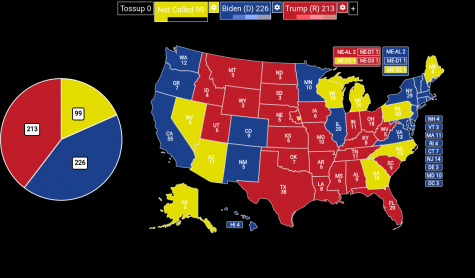The Trump autopsy: How America voted
In an election like no other, Democrat Joe Biden emerged victorious.
November 20, 2020
Election Day on November 3rd was unlike any election we’ve seen in a while. Unlike the past four election cycles, America had no idea who would win the presidential race (or any other state and federal races for that matter) on the night or the morning after the polls closed. Due in part to unique circumstances concerning the COVID-19 pandemic, the ways this election was held was unprecedented for our times.
On election night as the Alaska polls closed at 1 AM eastern time, former Vice President Joseph Biden (D-DE) had a lead in the projected electoral college votes (approx. 226 to 213) to that of incumbent President Donald Trump (R-FL). Despite the clear gap, Trump had a lead in several battleground states.

Trump into the night had a lead in the outstanding rust belt states he had won four years ago (Wisconsin, Michigan, and Pennsylvania) and also had a lead in the two yet to be called southern states of Georgia and North Carolina. Trump also led in the traditionally reliable Republican state of Alaska and also had a lead in the small prize of Maine’s 2nd congressional district (Maine and Nebraska split their electoral votes between their congressional districts and statewide vote). If Trump were to win all six of these states plus Maine’s 2nd Congressional district, he would’ve taken 81 projected electoral votes, putting him 24 electoral votes over the 270 required to win.
Though the situation at this point may have looked gloomy to Biden supporters, Biden was still pulling ahead of Trump in Arizona, Nevada, and Nebraska’s 2nd congressional district (a total of 18 electoral votes). However, as dawn broke in the early hours of November 4, Biden had taken the lead of Trump in the state of Wisconsin, and shortly after Michigan had swung to Biden’s favor. The two states were later called for Biden.
Both Biden and Trump election night had made regards concerning their progress in the election. Though both optimistic that the election was fairing in their favor, it was clear that there was going to be a tough battle up ahead in the states that were yet to be called. Trump had made claims of fraud while Biden had expressed his optimism for the results coming out of the states not called yet.
With 21 electoral votes short of the 270, Biden was looking to be the favorite to win the presidency. Trump was not closing the gap in Arizona, Nevada, or Nebraska’s 2nd Congressional District, and his leads were closing on him in Pennsylvania and slowly in Georgia.
A week after all the polls had closed, the race was called for President-elect Biden. Though there are still two states that are currently too close to call, Biden has secured a victory in Nevada, Pennsylvania, Arizona, and Nebraska’s 2nd Congressional District which puts him at a projected 290 electoral votes. As of now, Georgia and North Carolina have yet to be called. Biden maintains a very narrow lead of about 10,000 votes in Georgia while Trump holds a 75,000 vote lead in North Carolina. If Biden holds his lead in the Peach State, he will have won the same number of projected electoral votes as Trump did in 2016 (306 projected electoral votes, though when the electoral college met Trump received 304 electoral votes).
Though Biden was the favorite to win the election, the night didn’t come without surprises. Trump defied the polls and won the critical battleground state of Florida by 3.4% (which was an improvement of 2.2% from his 2016 victory in Florida), mainly due in part to gains made with the Latino community, Cubans in particular in Miami-Dade county. Trump had also won three very contested states, Texas, Ohio, and Iowa, by very decent margins, despite polling having the states as tossups or having Trump narrowly up.
Biden also had his big wins of the election, Biden was able to flip Arizona (a state that hadn’t voted for a Democratic president since 1996 and where Democrats performed strongly in the 2018 midterms) and was able to win very decisively in the contested states of Minnesota and New Hampshire.
Biden’s overall victory can be attributed to several factors. These can be seen by examining exit polls from both the 2016 and 2020 elections. In 2020, America was hit with the COVID pandemic which was a huge issue for Americans. It is no secret that the Trump Administration has fallen under scrutiny for its handling of the COVID pandemic, this gave the Biden campaign leverage. For Americans who were most concerned about the pandemic, the vast majority of them flocked to Biden. This also holds for many Americans who saw healthcare and racial tension as the biggest issue, they also overwhelmingly backed Biden.
Despite clearly winning over voters who were most concerned about the economy (which was the most concerning issue among voters) and crime and safety, Trump could not amount against the various social issues that were on the minds of many Americans. Biden improved with suburban voters by 6% compared to Hillary Clinton four years prior and won the demographic by a decent margin. Biden also did significantly better with Independent and moderate voters compared to Clinton’s performance in 2016.
Though irrelevant to the outcome of the election, Biden has won a majority in the popular vote with 50.7% of the vote to Trump’s 47.6% of the vote. Both Biden and Trump exceeded 70 million votes nationwide with Biden having over 75 million votes, the highest number of votes a candidate for the presidency has ever received.
As the election begins to head into the final steps with the electoral college meeting next month, the Trump campaign has filed multiple lawsuits against various battleground states over accusations of voter fraud and irregularities. Many Republican poll watchers and election judges from notable areas such as Detroit, MI and Philadelphia, PA have made claims that there was ballot dumping for Biden and eliminating Trump votes.
Despite the lawsuits, it is unlikely that they will have a significant outcome on the election. Nonetheless, Trump has not conceded the election to Biden, who has gone on to give a victory speech.
Pundits were right when they said that this election was going to be uglier than 2016. Given what our country has gone through this past year I can only hope that unity prevails after this Gettysburg of an election. I’m not thrilled that Biden was elected, but I can’t say I would’ve felt too much better if Trump had retained his position. I felt optimistic for Trump on election night. After a very decisive win in Florida, I was hoping for wins in Wisconsin, Pennsylvania, and Arizona.
In terms of social issues and policy as a whole, I can’t say I strongly back one candidate. I agree and disagree with both candidates too much to make an opinion on their stances on social issues. Even for foreign policy, I can’t say I feel strongly for either candidate. As for economic and fiscal issues, though I have disagreements on trade and high spending, I have to say I agree with and support Trump.
The economy late in the election became my number one issue. The debates are what swayed me to Trump. It wasn’t anything that Trump proposed, it was Biden said he would do. Biden discussed his plan to raise the corporate tax by 7%, phase out oil usage and production in the US, and implant regulation on the economy to make the US greener. Amid the recovery in a damaging recession, I do not see how this is beneficial for the country. Even taking the recession out of the equation, I feel these propositions will kill American jobs.
Regardless, I still believe that Libertarian nominee Jo Jorgenson would make a better president than the two of them. For much of this year, I was conflicted about whether to throw my support behind Jorgenson or Trump. However, I acknowledged that her chances of winning were impossible, I swallowed my hope for a Libertarian victory and backed Trump.
I hope that Biden will govern as a moderate and I hope that Trump will come to his senses and conclude his term with a peaceful transfer of power. That also means his insiders and die-hard supporters are also concluding that the American people have spoken and that decision should be respected.
However, there were various wins for Republicans in this last election. Republicans have gained as of now eight seats in the House of Representatives. Besides gains in the House, House Democrats still have small in-fighting between moderate members and progressive members (notably with the “Squad”).
“…And we need to not ever use the words ‘socialist’ or ‘socialism’ ever again. Because while people think it doesn’t matter, it does matter. And we lost good members because of it.” said Representative Abigail Spanberger, a Democrat from Virginia’s 7th congressional district that narrowly won re-election.
Representative Alexandria Ocasio-Cortez of New York’s 14th congressional district, and a member of the progressive “Squad”, referred to some Democrats who lost re-election in their house seats as “sitting ducks”. Ocasio-Cortez also fought back against claims that policies put forward by her wing of the party (which some see as part of a “socialist” agenda) were causing concern among voters. Ocasio-Cortez later refuted that struggling campaigns hadn’t invested enough in digital campaigns.
“There are folks running around on TV blaming progressivism for Dem underperformance. I was curious, so I decided to open the hood on struggling campaigns of candidates who are blaming progressives for their problems. Almost all had awful execution on digital. DURING A PANDEMIC.” Ocasio-Cortez tweeted.
Regardless, fighting among the ranks of House Democrats can only give the GOP leverage. Even incumbent House Speaker Nancy Pelosi (D-CA12) has fallen under intense scrutiny as the Democrats had net losses in the house, leading some Democrats to call her for her replacement as speaker.
Though knocking out vulnerable Republican senators in Colorado (Gardner) and Arizona (McSally), Democrats did not win enough on election night to take hold of the Senate. With a flip to the GOP in Alabama with former Auburn Coach Tommy Tuberville knocking out incumbent Democrat Doug Jones, Democrats had a net gain of one in the Senate.
It has all come down to the state of Georgia where Republican incumbents David Perdue and Kelly Loeffler will be heading off to a hotly contested runoff on January 5.
A Biden administration, a Democratic-controlled house, and the potential of a Republican senate are acceptable. It will keep Biden in line from making moves that are left of the center. Depending on Biden’s approval ratings, Republicans might garner enough support to flip the house and potentially make some gains in the senate. This can only happen though if the GOP has a backbone going into it though. The GOP has a great opportunity to recreate the 2010 midterms, and they should not let it go to waste.




